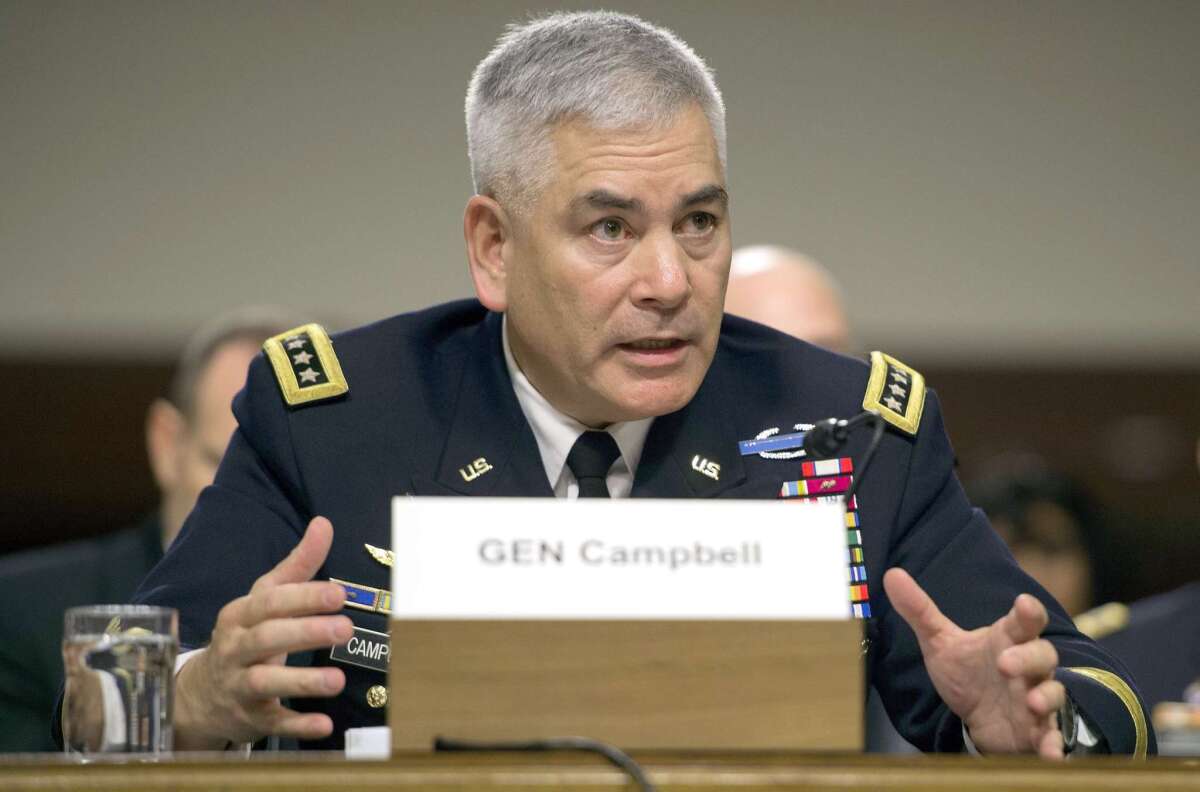Top U.S. commander in Afghanistan says attack on hospital was a mistake

U.S. Gen. John Campbell testifies before the Senate Armed Services Committee on Oct. 6, 2015, about the U.S. airstrike on a hospital in Afghanistan
- Share via
Reporting from Washington — Gen. John Campbell, the top U.S. commander in Afghanistan, told Congress on Tuesday that the deadly U.S. airstrike on a civilian hospital in Kunduz was a mistake, but he declined to endorse calls for an outside investigation.
Testifying before the Senate Armed Services Committee, Campbell said the hospital was “mistakenly struck” and that the decision to carry out the attack was made through the U.S. military chain of command.
Campbell thus offered a further refinement of previous Pentagon claims. On Monday, he told reporters that Afghan forces had called in the airstrike. The Pentagon initially had said the attack by an AC-130 gunship was ordered to protect U.S. forces on the ground.
NEWSLETTER: Get the day’s top headlines from Times Editor Davan Maharaj >>
The attack on the hospital run by Doctors Without Borders, a humanitarian aid group, killed 22 people and wounded dozens more.
“A hospital was mistakenly struck,” Campbell said. “We would never intentionally target a protected medical facility.”
His testimony did little to quell the rising controversy of how U.S. commanders responsible for vetting targets failed to identify the hospital, a well-known facility in the provincial capital. Doctors Without Borders officials have said they provided GPS coordinates of the site to the U.S. military before and during the attack.
The Pentagon, NATO and the Afghan government are conducting separate investigations into one of the worst U.S. attacks to produce civilian casualties since the war began 14 years ago.
Doctors Without Borders has demanded an independent inquiry, but Campbell said more senior officials would have to decide whether to cooperate with an outside investigation.
Campbell said Afghan forces who were under fire in Kunduz had requested the U.S. airstrike, but did not do so directly. He said they passed the request to a nearby U.S. special forces team that was communicating with the gunship that carried out the attack.
“We had a special operations unit in close vicinity that was talking to the aircraft” that conducted the attack, Campbell said.
The U.S. military is supposed to follow special rules before launching an air-to-ground attack to avoid civilian casualties. Campbell did not say if the procedures were followed, or why the attack was allowed to proceed.
“Even though the Afghans request[ed] that support, it still has to go through rigorous U.S. procedures” before an aircraft is allowed to carry out a ground attack, Campbell said.
U.S. warplanes and ground forces, including an undisclosed number of special operations troops, have been assisting Afghan forces trying to retake Kunduz since it fell to the Taliban on Sept. 28, the militant group’s first capture of a major urban center since the U.S. invasion in 2001.
Residents said Monday that government forces had regained near total control of the city of 300,000 and that many people were venturing outside for the first time since fighting began.
Campbell said Brig. Gen. Richard Kim, whom Campbell has ordered to investigate the hospital attack, was in Kunduz on Tuesday and was seeking to interview survivors, including staff from Doctor Without Borders.
The medical group said Monday it had closed the hospital and had withdrawn from Kunduz.
Twitter: @davidcloudLAT
ALSO:
In writings, Oregon gunman ranted about others being crazy
Justices disagree in case involving DirecTV class-action lawsuit
U.S. to release 6,000 prisoners as part of sentencing-reform campaign
More to Read
Sign up for Essential California
The most important California stories and recommendations in your inbox every morning.
You may occasionally receive promotional content from the Los Angeles Times.











